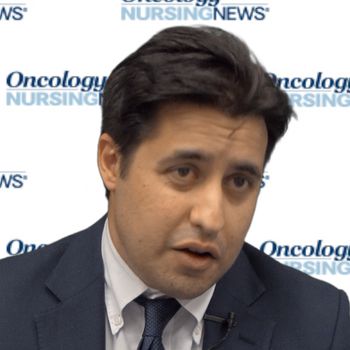
The FDA has approved an investigational new drug application for berubicin for the treatment of patients with glioblastoma multiforme.


Temferon Is a Viable Treatment Option in Newly Diagnosed Glioblastoma

Adjuvant Neratinib Does Not Improve Overall Survival in Glioblastoma, Yet May Offer Benefit for EGFR+ Subset

The FDA has approved an investigational new drug application for berubicin for the treatment of patients with glioblastoma multiforme.

AV-GBM-1, a personalized cancer vaccine, demonstrated an improvement in progression-free survival (PFS) in patients with newly diagnosed glioblastoma, according to data from a phase 2 trial (NCT03400917).

The FDA has granted a fast track designation to paxalisib for the treatment of patients with glioblastoma.

The FDA has granted a fast track designation for the PKCβ inhibitor enzastaurin for the treatment of patients with newly diagnosed glioblastoma.

The FDA has accepted a biologics license application for a proposed biosimilar for bevacizumab (Avastin), according to an announcement by Mylan during its fourth quarter 2019 earnings call.

Glioblastoma is historically difficult to treat, but recent research shows some potential for immunotherapy/vaccine combinations for these patients.

Two new single agents led to brain penetrance and 2-hydroxyglutarate (2-HG) suppression in patients with low-grade glioma who harbor IDH1 mutations, according to updated findings.

The Food and Drug Administration approved bevacizumab-bvzr (Zirabev) – a biosimilar for bevacizumab (Avastin) for the treatment of metastatic colorectal cancer; unresectable, locally advanced, recurrent or metastatic NSCLC; recurrent glioblastoma; metastatic renal cell carcinoma; and persistent, recurrent or metastatic cervical cancer.

Health-related quality of life (QOL) is becoming an increasingly important endpoint in cancer clinical trials.

Patients can track symptoms and anonymously send them to glioblastoma researchers around the world.

Children with severe sensorineural hearing loss (SNHL) from brain tumor treatment demonstrated greater reading difficulties compared with those who experienced mild or no hearing loss.

Nivolumab plus radiation did not improve overall survival compared to temololomide in patients with newly diagnosed glioblastoma.

Researchers are working on a way to spark the immune response against glioblastoma, making the nurses’ role in treatment even more important.

Children with pediatric posterior fossa tumors like medulloblastoma who are treated with radiotherapy may be less likely to recall specific details of events that occurred after treatmen.

I was particularly drawn to Robert Pearl, MD's comments on Senator John McCain's decision to discontinue therapy—he called it "a service to his family and loved ones."

In a phase 1 clinical trial, researchers injected a genetically altered version of the poliovirus into glioblastoma tumors.

Based on the identification of 6 gene variations that make carriers susceptible to developing medulloblastoma and possibly other cancers, researchers have proposed subgroup-based counseling and screening recommendations.

CE lesson worth 1 contact hour that is intended to advanced practice nurses, registered nurses, and other healthcare professionals who care for patients with cancer.

Clinical Trial in Progress: Investigators are seeking to determine whether the combination of eflornithine with lomustine can improve survival for patients with recurrent anaplastic astrocytoma, a rare form of brain tumor.

One drug may have discovered a path to overcome a particularly difficult hurdle in brain cancer treatment.

The combination of eflornithine (alphadifluoromethylornithine) and lomustine is currently being explored as a treatment for patients with recurrent anaplastic astrocytoma (AA).

The National Comprehensive Cancer Network (NCCN) has added the combination of TTFields (Optune) and temozolomide (Temodar) to its Clinical Practice Guidelines in Oncology for Central Nervous System Cancers for Category 1 treatment of newly diagnosed glioblastoma multiforme following maximal safe resection and completion of radiation therapy.

In a promising development in brain cancer research, injectable viruses have been found to be able to breach the blood-brain barrier and deliver immunotherapy to tumors.

Only a quarter of patients who have brain cancer enroll in hospice care with enough time to benefit from the comfort, symptom management and emotional support it can provide, a new study shows.

NextSource Pharma has raised the price of oral chemotherapy agent lomustine (Gleostine) by 1400% since acquiring the drug, which is used to treat Hodgkin lymphoma and glioblastoma, from Bristol-Myers Squibb in 2013.